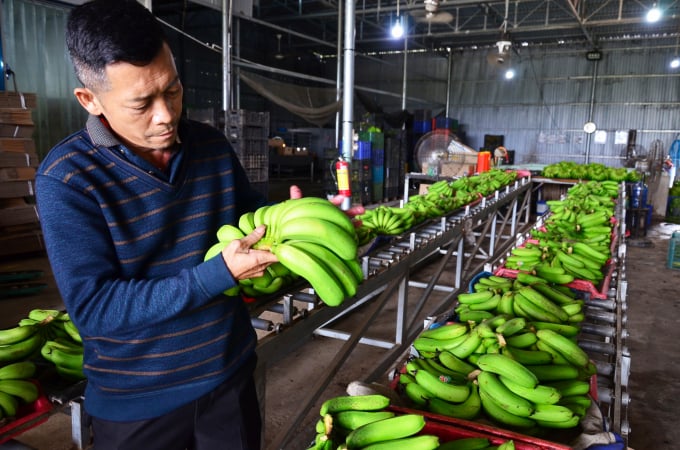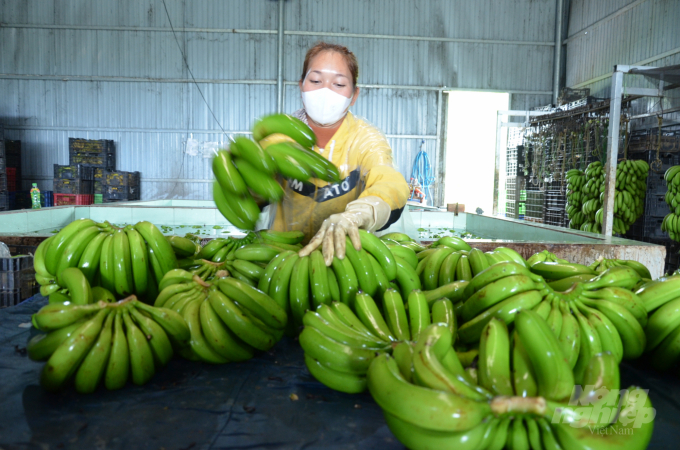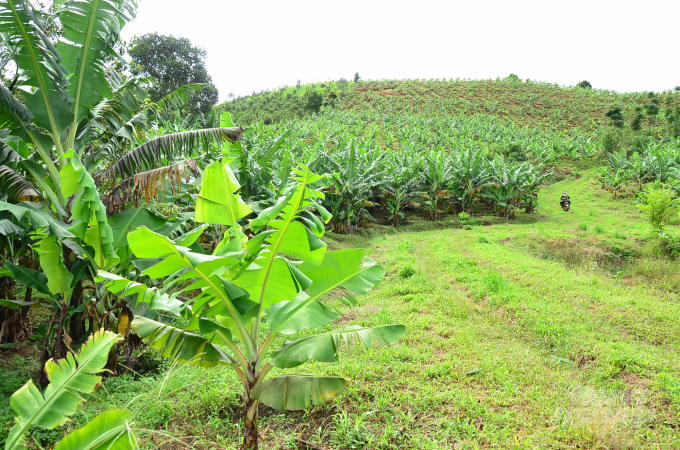May 22, 2025 | 04:28 GMT +7
May 22, 2025 | 04:28 GMT +7
Hotline: 0913.378.918
May 22, 2025 | 04:28 GMT +7
Hotline: 0913.378.918
Hearing Director of Da K'Nang Laba Banana Cooperative Nguyen Huy Phuong said sparked my curiosity, so I picked up some unqualified bananas from the basket, peeled them off, and took a bite. Old memories suddenly came to life when these bananas tasted like the Northern pepper banana eaten in the middle of autumn. After eating one, I just wanted to have another right away.
Laba bananas are big, have thick skin, short stalks, and a solid interior. They are not hollow like bananas grown in hot countries, not easy to break like normal bananas. Another thing is that Da K'Nang is located on the border of Phu Son, also at the same altitude of 1,200 m so its weather is always like winter all year round, making the bananas very firm, flexible, fragrant and sweet.

Nguyen Huy Phuong, Director of Da K'Nang Laba Banana Cooperative checking bananas in the workshop. Photo: Duong Dinh Tuong.
When Phuong was in 6th grade, the fun and games took priority, so he quitted. The words people said back then came to him more painfully than a whip: "One as stupid as yourself can only work as a farmer". And reality hit hard. Going through a life full of struggles, he took those words bitterly and started to tell himself: always learn new things.
After serving in the military, he left his homeland in Thanh Hoa to the South trying to make ends meet. One time his father heard about the fertile land of Da K'Nang. He immediately went in first to check out and then dragged his son along. Phuong started to plant coffee there in 1999. Having no capital, he had to work as a hired laborer to get money to buy fertilizer, borrowed some more to start trading.
Caught sight of the coffee market’s plummet, in 2017 he tried to plant 2 ha of tomatoes outdoor instead of using greenhouses. After making that bet with nature, he lost VND 100 million to that crop because fungus caused the fruit to rot. That failure directed his attention to Laba banana as this was the easiest to work with and the fastest to grow on this land.

Washing bananas in the workshop of Da K'Nang Laba Banana Cooperative. Photo: Duong Dinh Tuong.
“During the French colonial period, people brought this banana variety to plant on a plantation in Phu Son commune (Lam Ha district, Lam Dong province). The name Laba was taken after the name of that place. The French love LaBa bananas so much that they once exported them back to their country by plane, each trip of 100-200kg.
Seeing that almost every house here also grew 1-2 clusters of Laba bananas around the house for eating but not as a commodity, Phuong discarded 5 ha of inefficient coffee, bought tissue-cultured bananas in Da Lat and planted them then use a pickup truck to transport and sell the products. Customers find those bananas delicious, but they only consume them in small quantities, so when the bananas were ripe he had to throw a large portion of them away.
Later the Japanese came to Da K'Nang to survey this specialty banana variety and accepted trial imports.
“There was a time when I was about to give up everything and run away because in the 10 tons of goods exported I had to be discarded 7-8 tons because of poor designs. Meanwhile the domestic output was not available, so the damage was immense. In 2018 I founded Da K'Nang Laba Banana Cooperative with 7 members. Most of them had no money and were only able to contribute land, so I mainly took care of them. I helped them borrow money for investments from fertilizers to seeds. At that time the goods they made were not up to the standard, I still purchased for export but had to discard a lot. My only choice was to accept losses first as I did not dare to deduct money or put pressure on the people's purchasing prices. Accepting to support the people when they were still weak, it took nearly 2 years to earn their respect and have them follow me willingly," said Phuong.
Spraying microbiological preparations for bananas using drones. Footage provided by the character.
Now the cooperative is associated with more than 100 households, including 50% of K'Ho and Thai ethnic households. The total banana growing acreage is more than 300 ha, and it plans to expand to more than 1,000 ha. This year alone the cooperative has cooperated with a macadamia company to plant another 400 ha of bananas in the direction of intercropping.
In addition to selling fresh bananas, the cooperative also makes dried bananas and banana starch to diversify the products.
"The Japanese like Laba bananas very much. They are half-favored our bananas thanks to their distinct features, the remaining half is to practice production well. At first they flew over to inspect the packing stage and guide us from harvesting to bringing the bananas to the factory to wash off bacteria, putting the fruits in cold storage for hibernating, transporting them to the port and boarding the ship. In more than 200 categories according to Japanese standards, honestly, my cooperative still only meets half of it, but I am ready to work hard and learn more. Each member household of 2 workers can work on 2 ha of bananas. If coffee can make VND 100 million/ha/year, our bananas can create a profit of VND 300 million/ha/year.”

The vast banana hills of Da K'Nang Laba Banana Cooperative. Photo: Duong Dinh Tuong.
The cooperative currently has an output of nearly 5,000 tons/year, of which 70% is exported to Japan and 30% is consumed domestically. The cooperative is signing a contract to purchase bananas from the people at the price of VND 5,500/kg.
“We apply a closed production model, spray micro-organisms to raise plants, nourish the soil, and use excess bananas to inoculate microorganisms. At first we sprayed microorganisms manually, later we bought drones. The locals often do not pay enough attention to the ripeness factor so cooperative officials have to come down to the gardens to calculate the harvesting period, so people just need to take care of them according to instructions. Of course there are many small stages in the production process, but still, they cannot be neglected.
“Each member household of two laborers can work on 2 ha of bananas. If coffee can make VND 100 million/ha/year, bananas can create a profit of VND 300 million/ha/year. Thanks to the Laba banana gardens, most of the houses have televisions, refrigerators, washing machines. A lot of households have cars, and some have more than enough money to buy them. The matter becomes whether they want to," said Phuong.
Translated by Samuel Pham
![Reducing emissions from rice fields: [2] Farmers’ commitment to the soil](https://t.ex-cdn.com/nongnghiepmoitruong.vn/608w/files/news/2025/05/05/dsc08881jpg-nongnghiep-140632.jpg)
(VAN) Clean rice cultivation model in Thuong Tan commune, Bac Tan Uyen district, is assisting local residents in achieving sustainable agriculture by substantially reducing costs, increasing productivity, and protecting the environment.

(VAN) At the conference to disseminate Resolution No. 68, AgriS introduced its digital agricultural ecosystem and reaffirmed its commitment to accompanying the Government in promoting private sector development and sustainable agriculture.

(VAN) 'Blue Ocean - Blue Foods' initiative is designed to restore marine ecosystems and establish sustainable livelihoods for local communities by cultivating a minimum of 1,000 hectares of cottonii seaweed in the first three years.
/2025/05/21/4642-3-112707_603.jpg)
(VAN) The V-SCOPE project has made direct contributions to three out of six pillars of the Comprehensive Strategic Partnership between Vietnam and Australia.

(VAN) Facing the threat of rabies spreading to the community, Gia Lai province urgently carries out measures to vaccinate dogs and cats on a large scale.

(VAN) Disease-free livestock farming not only protects livestock herds but also stabilizes production and livelihoods for many farmers in Tuyen Quang.

(VAN) Japan's grant aid project contributes to capacity building, promoting organic agricultural production, and fostering sustainable community development in Dong Thap province.